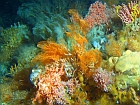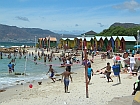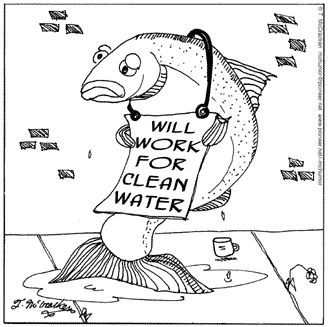1. Introduction
Why is marine pollution an issue?
What probably comes quickly to your mind are animals and plants that live in the oceans, people who live at the sea side or tourists who spend their holidays at the beach. It is obvious that they would be directly affected by polluted water.
44% of the world's population live within 150 kilometres of the coast. In numbers that's about 3 billion (3,000,000,000) people,
more people than inhabited the entire globe in 1950!
These people strongly depend on the sea in terms of health, living space, water supply,
recreational value and as a source of food (fisheries).
But how about places further inland?
Do you think the people below are affected by marine pollution?
- A snowboarder in the Austrian Alps
(distance to the nearest sea: approx. 500 km)Check your answer - A camp dweller in the desert of Lompoul in Senegal
(distance to the nearest sea: approx. 50 km)Check your answer - A resident of the city of Berlin
(distance to the nearest sea: approx. 200 km)Check your answer
These examples show:
no matter where we live!
And who is responsible?
On the last page you learned that marine pollution is not only caused by substances thrown or spilt directly into the sea.
The consequences that marine pollution may have on the social and economic welfare of people can be quite serious:
- Increased risk to human health
- Increased cost of human health protection
- Loss of water supplies
- Increased clean up costs
- Loss of tourism or recreational values
- Loss in fisheries
- Loss of property value
- Potential for international conflicts
- Damage to equipment
- Endangerment of species
- Costs of litigation
Thus, marine pollution is a topic that concerns all of us. Although it is on the news mainly when catastrophes like big tanker accidents happen or mass mortality affects the beaches, marine pollution is an issue we should all care about. It is also small amounts of litter or other harmful substances that pollute the marine environment!







